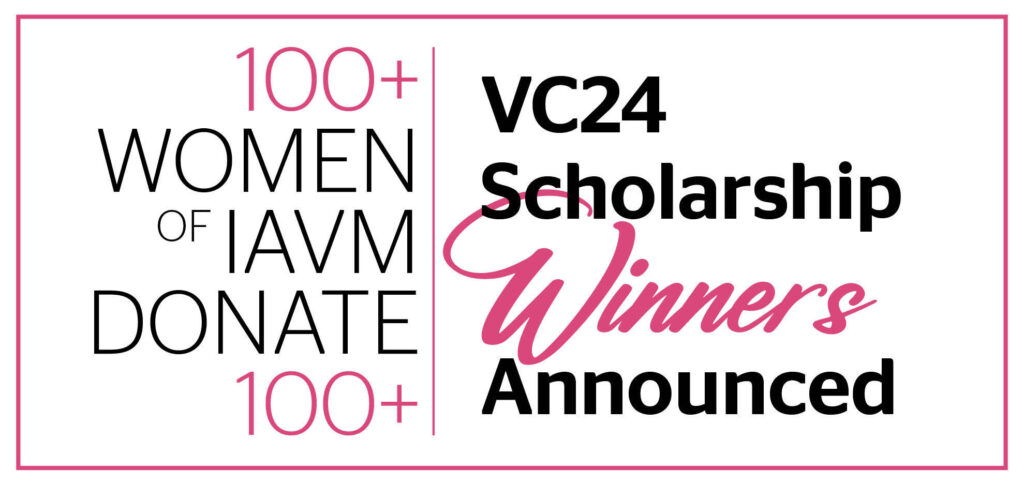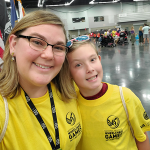IAVM Announces Eileen Kulish as the 2024 Joseph J. Anzivino Distinguished Allied Award Recipient

IAVM is pleased to announce Eileen Kulish, Customer Satisfaction Manager with MTS Steating, as the recipient of the 2024 Joseph J. Anzivino Distinguished Allied Award.
Kulish’s professional career includes 19 years with MTS Seating, beginning as their Inside Sales Coordinator in 2004. She was quickly promoted to National Accounts Executive in 2006, and in 2021, Kulish was named Customer Satisfaction Manager.
A member of IAVM for 20 years, Kulish has been a volunteer on the IAVM Allied committee for the past 8 years, serving as Vice Chair 2019-2020 and Chair 2021-2022. She has also previously served on the VenueConnect Programming Committee and Joseph A. Floreano Scholarship Selection Committee.
“Eileen has been a long-time supporter of our industry,” stated Kerry Painter, CVE, CEM, CMP, IAVM’s Chair of the Board of Directors. “She has selflessly given of time and passion to represent our Allied members and to be sure they have a strong voice. I am so pleased to see Eileen recognized by her peers and the membership.”
Upon being notified of receiving the award, Kulish said, “I am very honored to be this year’s recipient of the Anzivino award. Even more so, I am honored to have made lifelong friendships along the way. It is very humbling to know that my peers voted to bestow this great privilege to me.”
Kulish will be presented with the award at VenueConnect 2024, which is being held in Portland, Oregon, July 28-31. For more information on VC24 or to register, please visit https://venueconnect.iavm.org/.
Tammy Koolbeck, CVE Announced as the 2024 Charles A. McElravy Award Recipient

IAVM is pleased to announce Tammy Koolbeck, CVE, as the recipient of the 2024 Charles A. McElravy Award.
Currently, Koolbeck is the Executive Director of Stephens Auditorium at Iowa State University, a position she has held since 2015. She is only the 5th Director to lead the organization since the venues opened in 1969. She works for the Ames- based company, VenuWorks and has worked in the venue management industry for over 25 years.
Before coming to Ames, Koolbeck was a senior member of the VenuWorks corporate staff as Senior Vice President/Chief Marketing Officer. Prior to her corporate work, Koolbeck was Assistant Executive Director of Marketing and Programming for the U.S. Cellular Center Arena/Paramount Theatre and General Manager of the Cedar Rapids Ice Arena. Koolbeck started in the public assembly management field as the Director of Marketing for the Five Seasons Center and Paramount Theater. Her past work experience includes hotel, convention and visitor bureau, and professional sports.
Koolbeck has been a member of IAVM since 2001. She served as the 2019-2020 Chair for the International Association of Venue Managers Board of Directors and is currently heavily involved in the Association’s federal and state advocacy efforts. In 2014 and in 2021, she was honored with IAVM’s Chairman Citation. She currently serves as Chair on IAVM’s Board of Regents, on the Industry Affairs and Governance Committees, and serves as a mentor.
“I am excited to celebrate Tammy and her contributions to IAVM and our industry at VenueConnect,” stated Brad Mayne, IAVM CEO and President. “Tammy was instrumental in the advocacy work that IAVM did during the COVID-19 pandemic. Her volunteerism and service to IAVM have been extraordinary, and we are honored to name her as the 2024 Charles A. McElravy Award winner.”
“Tammy has served on countless committees and ultimately as the chair of our association in 2020 during an unprecedented year,” said Kerry Painter, CVE, CEM, CMP, IAVM’s Chair of the Board of Directors. “We will forever remember the advocacy efforts she engaged in which resulted in millions of recovery dollars for our industry. I could not be happier to congratulate Tammy as a perfect representation of the McElravy award.”
Upon being notified of receiving the award, Koolbeck stated, “To join the list of McElravy honorees means a lot, as it’s nominated by IAVM members and awarded by the IAVM Board of Directors. This association has so many great volunteer leaders and members that I’ve had the opportunity to connect with and develop long term relationships with over the years, and I am the fortunate one to be a part of this great community of peers. I’m definitely the recipient of many hours of shared wisdom and knowledge from others as passionate about this industry as I am, and I sincerely appreciate this recognition.”
Koolbeck will be presented with the award at VenueConnect 2024, which is being held in Portland, Oregon, July 28-31. For more information on VC24 or to register, please visit https://venueconnect.iavm.org/.
IAVM Announces Stacey Church, CVE, as 2nd Vice Chair 2024-2025

IAVM is pleased to announce the nomination of Stacey Church, CVE, for Second Vice Chair of the Board of Directors. Church will become a senior officer and serve a four-year term, taking on the Chair position in 2026-2027.
Church currently serves as the General Manager at Fair Park in Dallas, TX. Covering 277-acres just east of downtown Dallas, Fair Park’s cultural, historical, and entertainment venues play host to visitors from around the world every day of the year.
“Stacey has been an active leader in IAVM for years and is exceptionally capable of working in a collaborative manner, creating the vision and goals for our more than 7,700 venue professionals,” stated Brad Mayne, CVE, IAVM President and CEO.
Church has previously served on IAVM’s Board of Directors from 2021-2023 as the Director of the Convention Centers. She is currently serving as the Assistant Director for IAVM Region 6 and is on the Board of Governors and Strategic Leadership & Resources Committee.
“Stacey is going to do a wonderful job representing IAVM,” said Kerry Painter, CVE, CEM, CMP, Chair of IAVM’s Board of Directors. “Her passion for furthering and lifting all those around her will be a great asset as we develop our next generation of venue managers. She has been an unwavering volunteer throughout the years, and we are lucky to have her moving into the 2nd Vice Chair officer position.”
Prior to taking the GM position at Dallas Fair Park, Church served as the Assistant General Manager at the Kay Bailey Hutchison Convention Center in Dallas.
“I am honored to assume the role of 2nd Vice Chair on behalf of our members,” noted Church. “As a longstanding member, I am eager to contribute and collaborate with the leadership team to strengthen and expand pivotal projects within the Association. Focusing on enhancing certification and educational offerings, fostering member and volunteer involvement, and ensuring financial resilience are fundamental for the future prosperity of IAVM.”
IAVM members will vote electronically in June on Church’s nomination, and if elected, she will take office in July during IAVM’s VenueConnect Annual Conference and Trade Show, July 28 – July 31, in Portland, OR.
Kim Bedier, CVE, Leaving Honda Center, but Not the Industry
Kim Bedier, CVE, former chairman of IAVM and current dean of the Leadership Institute at VMS, is leaving Honda Center and OCVIBE, Anaheim, Calif., where she has been SVP and General Manager, effective May 3.
The announcement was made public while Bedier was assisting her husband, Richard Andersen, CVE, as keynotes at IAVM’s Region 7 meeting, appropriately themed “Breaking New Ground,” in Phoenix April 14-16. They taught there on team building. Two weeks earlier, they had taught life/work balance at Region 6 in Oklahoma City April 1-4. Bedier will be teaching again at VMS in June.
As questions boiled up throughout the industry about the why and what now of Bedier’s exit, she steadfastly insisted she had finally decided to “take my own advice for a change. I’ve never taken any time off and jumped from job to job. This industry isn’t easy. Now I have a new mantra – Self-care is not selfish. You don’t even do that for yourself. You do it for the people around you.”
Researching and putting together their life-work integration presentation “really solidified my decision and choice,” Bedier told Venue Professional. She is not, however, advising everyone to quit their jobs. “I’ve learned, especially from the younger generation, they have a better perspective. They want to make sure they have life-life as well as work-life. I wish I’d learned it sooner.”
Now, she is in a unique position. “I can do this and not everybody can. I’ve been given a bit of a gift, and I’m going to take it and make the most of it and figure out what I want to be when I grow up,” she said with a chuckle.
Besides continuing to do some work with her husband, though she’s not committing to that as a full-time job as of now, she intends to remain open. “I’ve always identified myself through my job. It’s not a crisis of identity, but it will be a mental shift, which is a good thing. I get to be whoever I am authentically… I don’t necessarily want to have a building again, but who knows? It’s all I’ve ever done. I want to stay open to opportunity, and it’s nice to have that luxury.”
She is proud of what has been accomplished at the 30-year-old Honda Center over the past three years. “It needed a little bit of reinvention. It’s going to get some incredible renovation [a $4B mixed-use development project, to be complete in 2032] coming up. But, also, just reestablishing it in people’s hearts and minds as a great venue to play and really making sure people understood it’s not in LA. Orange County is a strong, standalone market. We’re seeing things now like four Usher shows at the new Intuit Dome [Los Angeles] and Honda Center has two.”
On the other hand, she will also remember forever arriving in Anaheim during the pandemic when Honda Center was literally a testing site. One of her worst experiences was the last event before total shutdown – Disney on Ice. “It was horrible testing all those poor little toddlers [for Covid], and everyone was crying and mad at us.” One should not forget the pandemic and the toll it took on industry talent.
When teaching at Region 7, she noted, “It’s amazing how excited people are for me…Everybody is a bit tired I think.”

Kim Bedier, CVE, with Gwen Stefani at Honda Centers 30th anniversary concert this past September. From left, the arena’s Erika Muir and Tom Alexander, Stefani and Bedier.
She has been on the ground floor of planning a couple of new venues that will come on board at OCVIBE, including a 5,700-seat concert hall concept, to open in 2026, and a 2,000-cap club. “We’ve literally been able to influence from the ground up as operators. How often do you get that golden opportunity?”
“It will be exciting to watch those come to fruition and not have to do the work,” she said.
As to who will do that work, she noted there are some great people on the team left behind, including Tom Alexander, who she brought in from her former venue in Tacoma, and Bill Dwight from Live Nation who Alexander recruited to help book shows.
When Bedier arrived in Anaheim, she initially answered to Tim Ryan. When he left, she reported to Morell Marean, Chief Operating Officer of OC Sports and Entertainment. The current plan is to re-assign report-to’s on the organizational chart when she leaves.
“We appreciate the many contributions which Kim has made to our organization,” Marean said in a press release. “Her work has enhanced our guest service experience, reshaped our programming and concert business, and assisted in the strengthening of our team through the acquisition of key talent. Kim will certainly be missed, and we wish her all the best in her next chapter.”
Bedier came to Anaheim from Tacoma, Wash., where she worked for the city managing all sports and entertainment venues, including the Tacoma Dome, convention centers, theaters, and ball parks. “I wanted to know about all the venue types,” she said of that gig, which spanned the years 2012-2021.
Before that, she managed the under-construction arena in Everett, Wash., now known as Angel of the Winds Arena, for Global Spectrum. “It was fun to be part of an opening and create a strong team.” As is her modus operandi, she took some of that team with her to Tacoma.
It’s a special thrill to be part of a new building or major renovation project. She got a taste of that on a grand scale in Toronto, where she was on the team that transitioned from Maple Leaf Garden to the new Scotiabank Centre (then known as Air Canada Centre).
That was Bedier’s second grand opening, having started in the early 90’s when Grande Prairie in Northern Alberta recruited her, while working in recreation for the city and officed in the community ice rink, to open and manage the Crystal Centre (now Bonnetts Energy Centre) to host junior hockey and the upcoming Canada Winter Games. That building opened in 1995, the same year Bedier joined IAVM.
How has IAVM impacted her life and career?
“My career and my life are intertwined with IAVM: the incredible support I have received along the way, the phone calls and questions answered, the opportunities presented. More than anything, I value the deep relationships formed. Ultimately, it is the IAVM universe that connected me with the love of my life, Richard Andersen. I clearly owe a lot to this organization.”
Celebrating Our 100+ Women of IAVM VenueConnect Scholarship Winners and Launching Our Annual Fundraiser!

We are thrilled to announce the recipients of the 100+ Women of IAVM VenueConnect 2024 Scholarships!
Not only have we selected the recipients for the 100+ Women of IAVM Scholarship, but we’re also excited to kick off our annual fundraiser to support the remarkable initiatives of 100+ Women of IAVM.
Please join us in congratulating the following scholarship winners:

Sara Litster – HR Manager, ExtraMile Arena – Boise State University
“I have worked really hard my whole life to make a difference for women. So honored to receive this scholarship!”

Sarah Rhoades – Senior Event Manager, OVG Tulsa
“100+ Women of IAVM provides space and opportunity in the industry that was lacking, and I am thrilled to receive the VenueConnect 2024 scholarship.”

Donlisa Scott – Office Manager, Tacoma Venues & Events
“I am delighted to be a recipient of the 100+ Women of IAVM scholarship and for the opportunity to be highlighted as a woman in this industry. It signifies not just individual achievement but collective empowerment and support for women in venue management.”

Tiana Smith – Staffing and Student Engagement Coordinator, Kennesaw State University
“Thank you to all who donated to make this opportunity possible. I am excited to attend VenueConnect as a recipient of this scholarship. I love being a woman!”

Jouline Trotic, CMP – Senior Event Manager, Oregon Convention Center
“I am beyond excited to have been chosen for this scholarship and look forward to help in being a voice for women in our industry. As a mom in this industry, I understand how difficult it can be. Working odd days and hours and sometimes missing family moments. It is important that we support each other.”
As an organization dedicated to empowering women in venue management, we rely on the generosity and support of individuals like you to fuel our initiatives throughout the year. Every contribution makes a meaningful difference.
Join us in our mission by making a donation to support 100+ Women of IAVM. Your generosity will directly impact the lives and careers of women in our industry, helping to create a more diverse, inclusive, and vibrant community for all.
Together, we can continue to impact change, as well as empower and elevate women in venue management!
Do you want to receive a Front Row News weekly digest?
Categories
- Allied (856)
- Architecture (147)
- Arenas (744)
- Career (890)
- Convention Centers (889)
- Education (608)
- Events (1,528)
- Food & Beverage (193)
- Foundation (113)
- Guest Experience (1,482)
- Industry News (2,253)
- Leadership (1,872)
- Marketing (150)
- Membership (1,985)
- Music (212)
- Performing Arts Centers (453)
- Professional Development (398)
- Research (127)
- Safety & Security (425)
- Sports (763)
- Stadiums (607)
- Student (159)
- Technology (515)
- Ticketing (92)
- Touring (82)
- Trends (357)
- Uncategorized (771)
- Universities (216)
- Video (25)
- Young Professional (198)
Twitter Feed
- Twitter feed loading
Recent Posts
- GEODIS Park Selects Allied Universal As Its Preferred Event Services Provider
- Venuworks Appoints Marc Solis as Executive Director of the Fresno Convention and Entertainment Center
- Los Angeles Convention Center Diverts 8,000 Pounds of Wood Waste to Local Foundation Supporting Fire Victims
- Fort Worth Unveils Plans for Phase 2 of Convention Center Transformation
- San Diego Convention Center CEO Announces Retirement After a Decade of Leadership
Categories
- Allied
- Architecture
- Arenas
- Career
- Convention Centers
- Education
- Events
- Food & Beverage
- Foundation
- Guest Experience
- Industry News
- Leadership
- Marketing
- Membership
- Music
- Performing Arts Centers
- Professional Development
- Research
- Safety & Security
- Sports
- Stadiums
- Student
- Technology
- Ticketing
- Touring
- Trends
- Uncategorized
- Universities
- Video
- Young Professional
Archives
- February 2026
- January 2026
- December 2025
- November 2025
- October 2025
- September 2025
- August 2025
- July 2025
- June 2025
- May 2025
- April 2025
- March 2025
- February 2025
- January 2025
- December 2024
- November 2024
- October 2024
- September 2024
- August 2024
- July 2024
- June 2024
- May 2024
- April 2024
- March 2024
- February 2024
- January 2024
- December 2023
- November 2023
- October 2023
- September 2023
- August 2023
- July 2023
- June 2023
- May 2023
- April 2023
- March 2023
- February 2023
- January 2023
- December 2022
- November 2022
- October 2022
- September 2022
- August 2022
- July 2022
- June 2022
- May 2022
- April 2022
- March 2022
- February 2022
- January 2022
- December 2021
- November 2021
- October 2021
- September 2021
- August 2021
- July 2021
- June 2021
- May 2021
- April 2021
- March 2021
- February 2021
- January 2021
- December 2020
- November 2020
- October 2020
- September 2020
- August 2020
- July 2020
- June 2020
- May 2020
- April 2020
- March 2020
- February 2020
- January 2020
- December 2019
- November 2019
- October 2019
- September 2019
- August 2019
- July 2019
- June 2019
- May 2019
- April 2019
- March 2019
- February 2019
- January 2019
- December 2018
- November 2018
- October 2018
- September 2018
- August 2018
- July 2018
- June 2018
- May 2018
- April 2018
- March 2018
- February 2018
- January 2018
- December 2017
- November 2017
- October 2017
- September 2017
- August 2017
- July 2017
- June 2017
- May 2017
- April 2017
- March 2017
- February 2017
- January 2017
- December 2016
- November 2016
- October 2016
- September 2016
- August 2016
- July 2016
- June 2016
- May 2016
- April 2016
- March 2016
- February 2016
- January 2016
- December 2015
- November 2015
- October 2015
- September 2015
- August 2015
- July 2015
- June 2015
- May 2015
- April 2015
- March 2015
- February 2015
- January 2015
- December 2014
- November 2014
- October 2014
- September 2014
- August 2014
- July 2014
- June 2014
- May 2014
- April 2014
- March 2014
- February 2014
- January 2014
- December 2013
- November 2013
- October 2013
- September 2013
- August 2013
- July 2013
- June 2013
- May 2013
- April 2013
- March 2013
- February 2013
- January 2013
- May 2012
- March 2012
- December 2011
- November 2011
- October 2011
Recent Comments
- Frank Bradshaw, Ph.D., CVE on John Meyer, CVE, a Tireless Advocate of Certification for Venue Professionals, Has Died
- Neil Sulkes on Hilary Hartung, Friend to Many in Venue Marketing, Has Left Us
- Jason Parker, CVE on The Devastation of Hurricane Helene and How We Can Support One Another
- Larry Perkins on Touhey Testifies Against Speculative Ticketing Before Congressional Subcommittee
- Peter Secord on Major Players for Planned Elkhart Amphitheater Were in the Mix at VenueConnect
